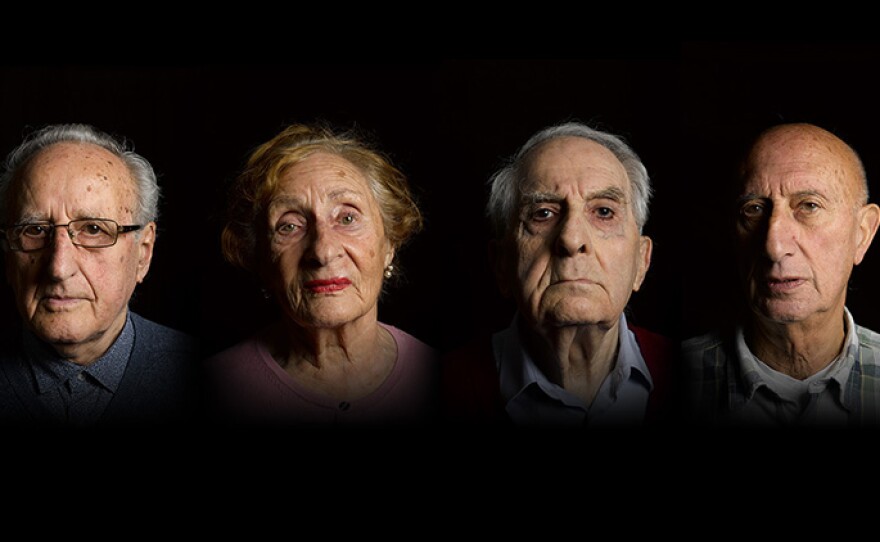Tuesday, May 7, 2024 at 10 p.m. on KPBS TV / Stream now with the PBS App + Encore Thursday, May 9 at 10 p.m. on KPBS 2
As young children, they lived through “humanity’s darkest hour.” Now, over 70 years after World War II, FRONTLINE speaks with some of the last remaining survivors of the Holocaust, in “The Last Survivors.”
“We are the last ones, when we’ve gone.... Then it’s all history books,” Anita Lasker-Wallfisch tells FRONTLINE.
Drawing on intimate interviews with victims and family members, Director Arthur Cary presents a haunting look at how disturbing childhood experiences and unimaginable loss have impacted the daily lives and relationships of survivors – from survivor’s guilt, to crisis of faith, to second-generation trauma.
“Once we were incarcerated in the camps... I think we tended to grow up pretty fast,” says Manfred Goldberg, who opens up about what he experienced during the Holocaust for the first time on camera. Goldberg recalls that after returning from a day of hard labor at the Auschwitz concentration camp, his little brother Herman appeared to have “vanished from the face of the Earth.” Goldberg had wondered what happened to Herman ever since that day: “I have never recited any memorial prayer on his behalf, always making myself believe that maybe he’s still alive.”
The film follows Goldberg as he returns to his childhood hometown in Germany for the first time since 1946, capturing the moment he finally acknowledges and grapples with the death of his little brother. Cary also accompanies other Holocaust survivors on the personal and profound journeys of reconciling their indelible grief throughout the film.
Among others, we also meet:
- Ivor Perl, who tries to open up to his daughter about the deep pain and anguish he experienced by returning to Auschwitz with her. His daughter, Judy, suffers from second-generation trauma.
- Maurice Blik, an accomplished sculptor who remains haunted by not knowing exactly what happened to his father in the Holocaust: “It’s always been a struggle...how do you deal with that loss and my need to somehow bring my father back to life?” His wife says that many of the faces on his sculptures have an uncanny resemblance to pictures of Maurice’s father.
- Susan Pollack, who vividly recalls her arrival at Auschwitz. “I remember the arriving very clearly, when the doors opened up. And the terror and the aggression hit us immediately.... We were dehumanized from the beginning,” she says. Pollack also remembers the last moment she saw her mother before she was sent to the gas chambers: “There was no parting words. There was just a hug and ‘I love you.’”
- Anita Lasker-Wallfisch, a German Holocaust survivor who delivers a powerful warning to the Bundestag, the German federal government: “Hate is poison, and ultimately those who hate poison themselves.... The future lies in your hands.”
“The Last Survivors” paints a portrait of what is most troubling to many Holocaust survivors as they contemplate reaching the end of their lives – specifically the rise in anti-Semitic sentiments around the world. Lasker-Wallfisch tells the German government she fears that history could repeat itself: “We cannot blame today’s young people if they refuse to identify with these crimes....But to deny that this is part of German history as well, that must not happen.”
“Time is marching on and it will not be long before there will be no first-hand survivors alive,” says Manfred Goldberg. “And it is important to record this testimony as evidence for future generations.”
RELATED: How Technology Helps Preserve the Testimony of Holocaust Survivors
Watch On Your Schedule: Episodes of FRONTLINE are available to stream with the PBS App.
Join The Conversation: FRONTLINE is on Facebook, Instagram #frontlinePBS
Credits: A Minnow Films production for BBC and WGBH/FRONTLINE. The producer and director is Arthur Cary. The senior producer is Dan Edge. The executive producer of FRONTLINE is Raney Aronson-Rath.





